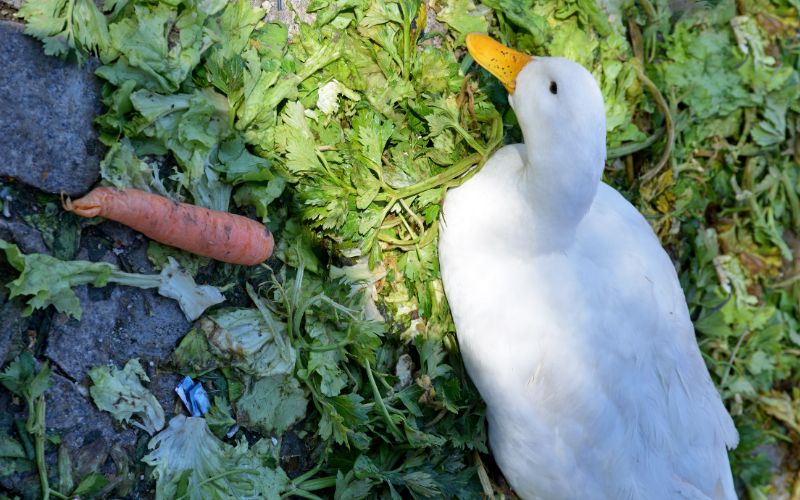If you have ducks as pets or farm animals, you might wonder what kind of treats you can give them to spice up their diet and make them happy. You probably know that they love to eat vegetables, but can they eat carrots?
And if so, are carrots good for them? The answer is yes, ducks can eat carrots, and they will enjoy them very much.
Carrots are not only tasty, but they also offer many health benefits for ducks. In this blog post, we will explore six amazing benefits of feeding vegetables to your ducks, as well as some tips on how to prepare and serve them.
1. Energy and Hydration
Carrots are mostly made up of water and carbohydrates, which are important for ducks to have energy and stay hydrated. They have a low glycemic index, meaning they give ducks a steady supply of energy without causing sudden increases in blood sugar levels.
Additionally, they have dietary fiber that aids digestion and promotes regular bowel movements. This can help prevent common issues like constipation and diarrhea.
A medium-sized carrot (61 grams) provides 2 grams of fiber, which is about 44% of the daily recommended intake for adult ducks. However, it is important to note that the fiber content of carrots can vary depending on the variety and how it is grown.
2. Improvement of Vision and Eye Health
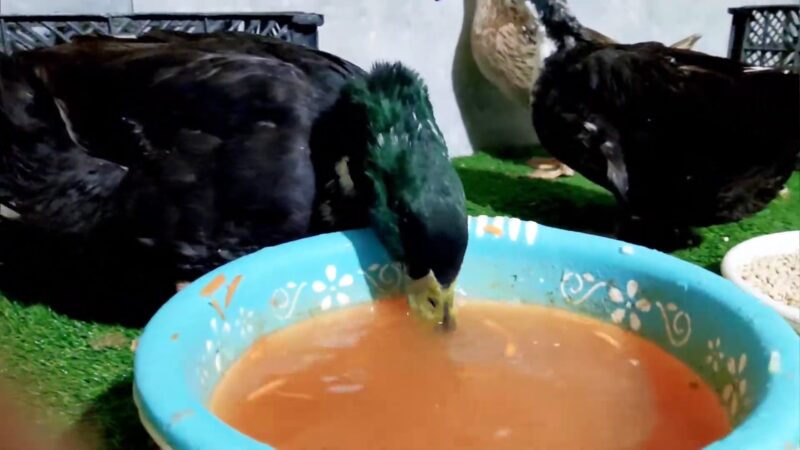
These vegetables are famous for being good for the eyes, and this is true for ducks as well. They are rich in beta-carotene, a pigment that gives them their orange color and that the body converts into vitamin A.
Vitamin A is essential for vision, especially in low-light conditions, and for preventing eye infections and diseases. Ducks that do not get enough vitamin A may suffer from night blindness, cataracts, conjunctivitis, and other eye problems.
A medium-sized carrot provides 509 micrograms of vitamin A, which is more than 50% of the daily recommended intake for ducks. Carrots also contain other antioxidants, such as lutein and zeaxanthin, that protect the eyes from oxidative stress and damage caused by UV rays and free radicals.
These antioxidants may also reduce the risk of age-related macular degeneration, a leading cause of blindness in humans and animals. However, more research is needed to confirm this.
3. Immunity Boost and Infection Prevention
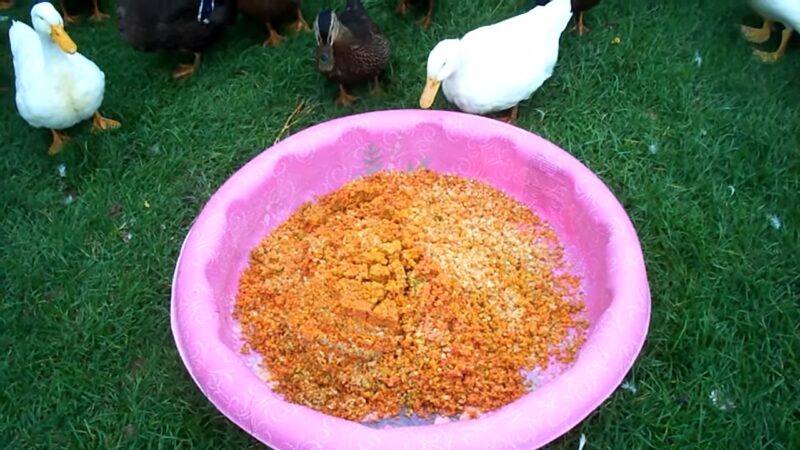
Another benefit of carrots for ducks is that they boost their immune system and help them fight off infections and diseases. They contain vitamin C, which is a powerful antioxidant that supports the production and function of white blood cells, the main defender of the body against pathogens.
Vitamin C also helps with wound healing, collagen synthesis, and iron absorption. A medium-sized carrot provides from 1.5 to 2.5 milligrams of vitamin C, which is about 4% of the daily recommended intake for ducks.
Carrots also contain phytochemicals, such as polyacetylenes, that have anti-inflammatory and antibacterial properties. These compounds can inhibit the growth of harmful bacteria, such as Salmonella and E. coli, that can cause food poisoning and diarrhea in ducks.
4. Egg Production Enhancement and Quality Boost
If you have female ducks that lay eggs, you might want to feed them carrots to improve their egg production and quality. The vegetable contain biotin, a B vitamin that is involved in the metabolism of fats, proteins, and carbohydrates, and that is essential for the formation and development of the eggshell.
Biotin deficiency in ducks can lead to poor egg quality, cracked shells, reduced hatchability, and deformities in the ducklings. A medium-sized carrot provides 6 micrograms of biotin, which is about 20% of the daily recommended intake for ducks.
Carrots also contain beta-carotene, which gives the egg yolk a bright orange color and enhances its nutritional value. Beta-carotene is a precursor of vitamin A, which is important for the growth and development of ducklings.
Feeding ducks eggs with increased levels of omega-3 fatty acids is good for their brain and heart health. Although carrots don’t boost omega-3 levels as much as direct supplementation, including them in a balanced duck diet can still enhance the overall nutritional value of the eggs and provide various nutrients, including omega-3 fatty acids.
5. Promotion of Feather Growth and Skin Health
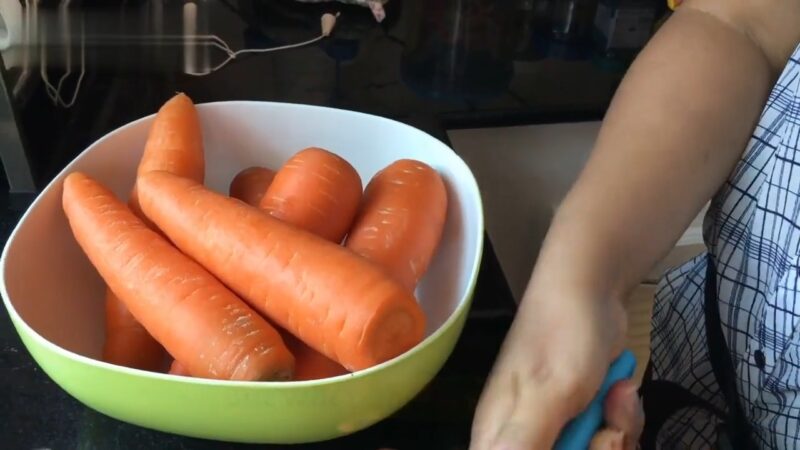
Carrots can also help your ducks look good and feel good, by promoting their feather growth and skin health. They contain vitamin K, which is involved in blood clotting and bone formation, and is also important for the synthesis of keratin, the main protein in feathers and skin.
Vitamin K deficiency in ducks can lead to bleeding disorders, weak bones, and poor feather quality. A medium-sized carrot provides 8 micrograms of vitamin K, which is about 7% of the daily recommended intake for ducks.
They also contain vitamin E, which is another antioxidant that protects the skin and feathers from oxidative damage and inflammation. Vitamin E also helps with the absorption of vitamin A and enhances the immune system.
A medium-sized carrot provides 0.6 milligrams of vitamin E, which is about 4% of the daily recommended intake for ducks.
6. Cancer and Other Diseases Prevention
Last but not least, carrots can prevent cancer and other diseases in ducks, thanks to their high content of antioxidants and phytochemicals. Carrots contain carotenoids, such as beta-carotene, alpha-carotene, and lycopene, that have been shown to reduce the risk of various types of cancer, such as lung, breast, prostate, and colorectal cancer, by inhibiting the growth and spread of tumor cells.
They also contain polyacetylenes, such as falcarinol and falcarinol, that have been found to have anti-cancer effects, by inducing apoptosis (cell death) and preventing angiogenesis (blood vessel formation) in tumor cells. Carrots may also protect ducks from other diseases, such as diabetes, obesity, arthritis, and cardiovascular disease, by modulating blood sugar levels, reducing inflammation, lowering cholesterol levels, and improving blood pressure.
How to Prepare and Serve
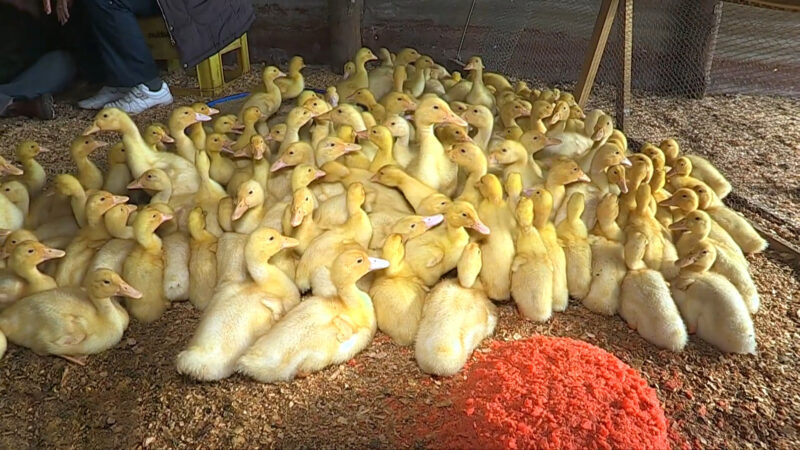
Now that you know the benefits of carrots for your ducks, you might wonder how to prepare and serve them. Here are some tips to follow:
- Rigorously clean the vegetables to eliminate any soil or chemical residues. Peeling is optional since the skin is both nutritious and safe for consumption.
- Chop the carrots into duck-friendly, small pieces. Alternatively, grating or mashing them can make them softer and easier for your ducks to digest.
- Soften and sweeten the carrots by cooking them. Suitable methods include boiling, steaming, roasting, or microwaving, but refrain from adding salt, sugar, oil, or spices, which are harmful to ducks.
- The green tops are also a healthy option and can be fed to your ducks. Chop them up or offer them whole, based on what your ducks prefer.
- Offer carrots to your ducks only as an occasional treat. Ensure that they do not exceed 10% of their diet to avoid issues like obesity, diarrhea, and nutritional imbalances, as carrots are high in sugar and low in protein.
- Maintain a varied diet for your ducks, incorporating a mix of other vegetables, fruits, grains, seeds, and pellets. A diverse and balanced diet is crucial for the health and well-being of your ducks.
FAQ
How often should I feed them to my ducks?
Carrots should be fed to ducks as a treat and not as a main part of their diet. It’s recommended to offer carrots in moderation, perhaps a couple of times a week, ensuring they don’t exceed 10% of the ducks’ overall diet.
Can ducklings eat the vegetable, and if so, at what age?
Ducklings can eat carrots, but it’s best to wait until they are at least four weeks old. The carrots should be grated or mashed to make them easier for the ducklings to eat.
Are there any risks associated with feeding too many carrots?
Yes, feeding ducks too many carrots can lead to nutritional imbalances. They are high in sugar and low in protein, so overfeeding can cause issues like obesity and diarrhea in ducks.
Do they affect the color of duck eggs?
Carrots can influence the color of duck egg yolks due to their beta-carotene content. Feeding ducks carrots can result in a brighter, more orange yolk.
Can I feed my ducks carrots during the winter?
Yes, they can be a good source of nutrients for ducks during the winter. They provide extra energy and can help maintain hydration when water sources might be scarce.
Is it better to feed ducks raw or cooked carrots?
Ducks can eat both raw and cooked carrots. However, cooking carrots can make them softer and sweeter, which might be preferable for some ducks, especially the younger or older ones. Just ensure no salt, sugar, oil, or spices are added when cooking.
Final Words
Carrots serve as an excellent snack for ducks, offering both flavor and a host of health benefits. These root vegetables are not only delicious but also packed with nutrients that contribute to energy levels, hydration, improved vision, stronger immunity, enhanced egg production, better feather growth, and disease resistance.
Offering carrots to your ducks, either in raw or cooked form, including the nutritious carrot tops, is a good practice. However, it’s important to remember that they should be given as a supplement to their main diet, not as a replacement.
Integrating carrots into a diverse and balanced diet is key to addressing the overall nutritional requirements and tastes of your ducks.
